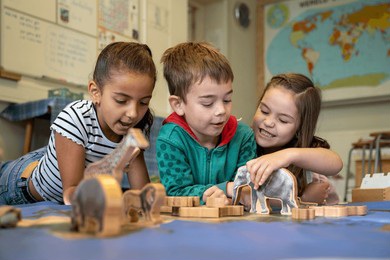There is no doubt that play is a very essential aspect of a child’s learning process because it is primarily child-initiated and teacher-supported. Sadly, its role has been rated as an insignificant enjoyment. However, the conclusion of a collection of studies has shown otherwise. Play-based learning has been proven purposeful and accepted as a potent teaching tool that can birth a new system that could aid childhood education.
A. The Empirical Benefits of Play
Dr. Stuart Brown, an acknowledged play expert, has emphasized the importance of play in brain development. He says that through play, “children explore the world around them, experiment with ideas, and test suppositions.” Pioneer Jean Piaget further supports this claim.
Piaget’s theory on cognitive development further shows the importance of play in children building their comprehension of the world, using dexterity play and giving them the opportunities to play by themselves.
A statistical combination of findings published in 2016 titled “Review of Educational Research” examined 35 studies on the significance of play-based learning in preschool children. Indeed, outcomes have shown the impact play has had on children’s mental skills, mainly in mathematical skills, reading and writing skills, and also in processing their speech with effective communication.
Play doesn’t just evolve around academics; it helps children to start understanding who they are, what they are feeling at times and what to expect when connecting with others. Dorothy Singer, a renowned psychologist expert in play, has shown how pretend play has helped teach empathy, cooperation, and negotiation.
A study published in a journal in 2018, “Early Childhood Research Quarterly”, discovered that Children who gave in to dramatic play portrayed impressive social skills and emotional management with the right response compared to the others.
B. Surpassing the Research: Play in Action
Play-based learning has been shown to impact classrooms all over the world positively. It starts with children probably building towers with blocks, enacting roles amongst themselves such as architect, builder, etc and solving challenges even as they engage in building.
As simple as it seems, this building activity has helped build the children’s relating skills, motion skills (using their hands and wrists), communication skills, partnership and ability to reason accurately.
Easy ways to playful learning: Scope for Teachers.
The effectiveness of play has proven to be indisputable, but teachers have a major role in incorporating this into the classroom. Here are some devised strategies:
- Generate a Play-Friendly Environment: Create a classroom space where students can play, using costumes and props and sensory play items like kinetic sand and water.
- Get Age-Appropriate Toys and Learning Aids: Choose toys that best fit their developmental phase and learning targets, such as puzzles, building blocks and art materials to birth creativity and give them mediums to explore.
- Be a playful observer, not an intruder: Be open to being their audience. Just observe how the children connect during the play and provide guides when relevant to increase their learning process.
- Fuse Play into the Curriculum Objectives: Incorporating play into learning activities contributes to achieving specific educational objectives. Play should be interwoven into their learning process. For instance, children can learn about shapes and colors with their toys, or they can be taught through storytelling in a dramatic way to aid their memory.
- Note down and Concentrate on their progress at times: Even as you observe the children’s play, write down their flaws, progress, challenges and also how they think to know how to handle them best and see which areas they are making progress and most importantly, ensure they are making progress from the play activities you have made available.
C. Conclusion: Play is a powerful tool for children that shouldn’t be overlooked.
It’s not wrong to give into play-based learning as it has been proven to be scientifically sound when dealing with childhood education. To understand the crucial benefits of play, teachers can create a fascinating learning environment that can wholesomely help nurture the child. Play is beyond mere fun, and it’s a powerful weapon for unveiling a child’s full potential, so let us embrace it.
———————————-
Mrs. Omotola Lawson is a seasoned Toy Distribution Entrepreneur and government-certified Instructor with a proven track record. She excels in attracting and securing international investors for Nigeria and designing and delivering comprehensive ‘Train the Trainers’ programs for child-focused organizations in both the private and public sectors. Notably, 15 years ago, she founded the first dedicated toy outlet in Lagos, a pioneering venture that has made a significant impact in the industry.






